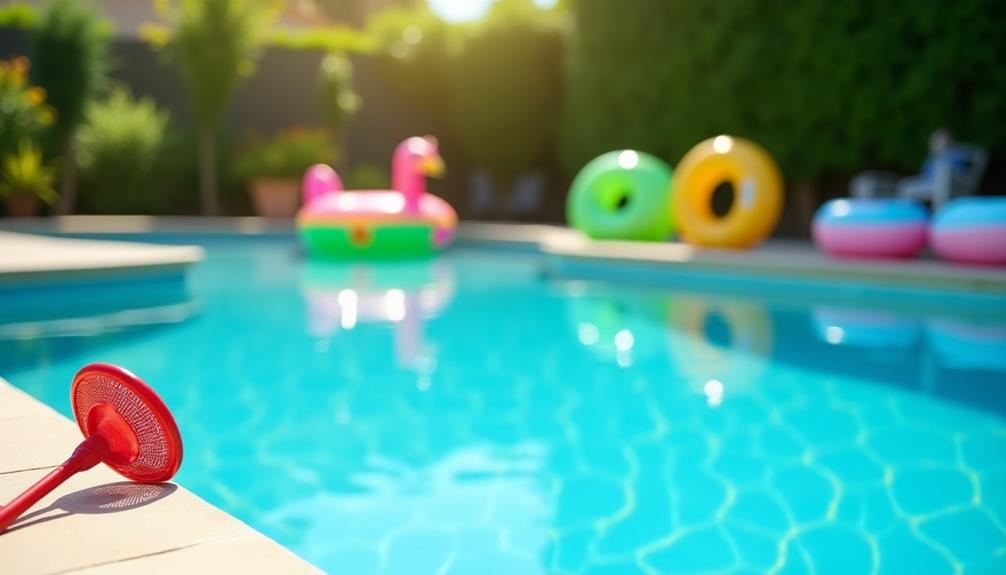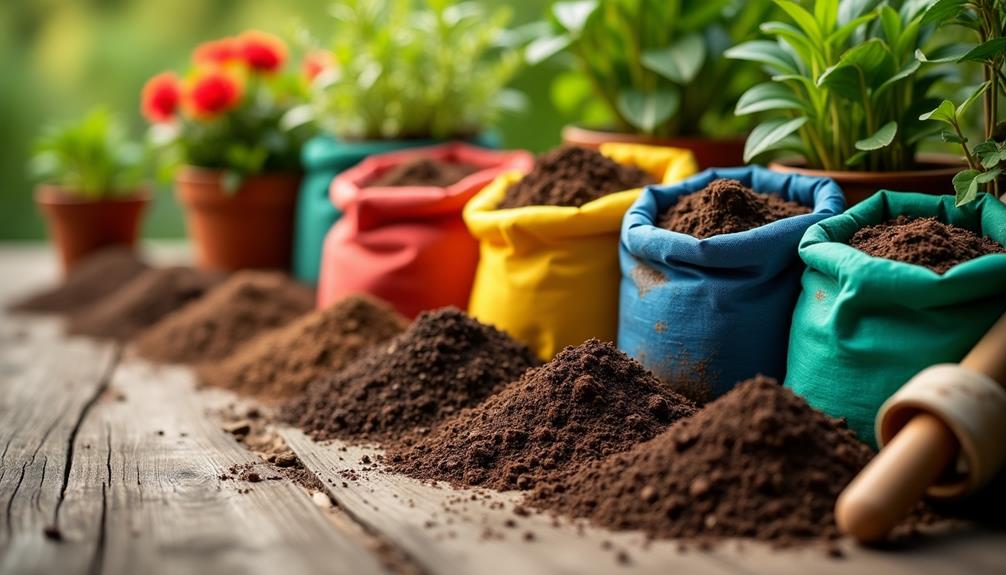Keeping your pool clean, safe, and inviting is essential for every homeowner, but it also requires consistent effort, attention to detail, and a bit of know-how. You might be wondering where to start or how to stay on top of maintenance tasks without feeling overwhelmed. From skimming debris and balancing chemicals to inspecting equipment and seasonal preparations, there's a lot to cover. Understanding these key aspects can not only enhance your pool experience but also protect your investment in the long run. What specific maintenance strategies will make the biggest difference for you?
Regular Skimming and Cleaning
How often do you find yourself skimming your pool? If you haven't made it a regular habit, you're missing out on a crucial aspect of pool maintenance. Regular skimming keeps your pool looking pristine and prevents debris from sinking to the bottom.
You want to develop effective skimming techniques to make this chore quick and efficient. Start by choosing the right cleaning tools. A long-handled skimmer net is essential, allowing you to reach every corner of your pool without straining.
Make sure to use a net with a fine mesh to capture even the smallest leaves and bugs. When skimming, move the net in a smooth, sweeping motion across the surface. It's best to skim in a circular pattern to ensure you catch everything.
Aim to skim your pool at least once a week, or more frequently during heavy leaf fall or windy days.
Balancing Water Chemistry
Keeping your pool clean goes hand in hand with maintaining balanced water chemistry. Start by regularly testing your water's pH levels, aiming for a range of 7.2 to 7.8. If your pH is off, you'll need to make alkalinity adjustments to keep your water comfortable and safe.
Next, focus on chlorine balance, which is crucial for effective sanitation. Ensure you're using the right sanitizer options, and consider shock treatments to eliminate contaminants.
Don't forget about water hardness, as high levels can lead to scaling, while low levels can corrode your pool surfaces. Regularly check stabilizer levels, especially during seasonal fluctuations, to protect chlorine from the sun's effects.
Balancing mineral content is another essential aspect of pool care. Too many minerals can cloud your water and create unwanted algae growth.
Make sure you're performing regular chemical testing to keep everything in check. By staying proactive with these steps, you'll not only enhance your pool's clarity but also prolong its life and safety.
Your efforts in balancing water chemistry will pay off with a sparkling, inviting swimming pool.
Cleaning the Pool Filter
A pool's filter is vital for maintaining clean and clear water, so regular cleaning is essential. Different filter types, like cartridge, sand, and diatomaceous earth, each require specific cleaning methods, so know which one you have.
For cartridge filters, remove the cartridge and rinse it thoroughly with a hose to eliminate debris. If you have a sand filter, backwash it according to the manufacturer's instructions to remove trapped dirt and particles. Diatomaceous earth filters require you to disassemble the filter and replace the DE powder after cleaning.
Cleaning your pool filter not only improves water quality but also extends the filter lifespan. A well-maintained filter operates more efficiently, reducing energy costs and the need for frequent replacements.
Make it a habit to check your filter every month, or even more often during heavy swimming seasons. Watch for pressure gauges; if the pressure exceeds the normal range, it's a clear sign that cleaning is necessary.
Inspecting Pool Equipment
To keep your pool running smoothly, regular equipment checks are essential.
Make sure to clean filter systems and monitor water levels routinely.
Regular Equipment Checks
Regular equipment checks are essential for maintaining a healthy and safe swimming pool. By performing routine inspections, you can identify potential issues before they turn into costly repairs.
Start by checking the pump and motor—look for any unusual noises or leaks. Make sure the seals are intact and the connections are secure.
Next, inspect the pool heater and ensure it's functioning properly. Check for any signs of corrosion or rust, as this can impact the equipment lifespan.
Don't forget to examine the skimmer and return lines; any blockages can reduce efficiency and strain your system.
You should also regularly assess the pool automation system, if you have one. Ensure all sensors and controls are working correctly, and replace any faulty components to keep everything running smoothly.
Lastly, monitor the water levels and chemical balance; imbalances can stress your equipment and lead to premature wear.
By prioritizing these routine inspections, you'll not only extend the lifespan of your pool equipment but also enhance the overall swimming experience for you and your family.
Regular checks can save you time, money, and stress in the long run.
Clean Filter Systems
Cleaning filter systems is crucial for keeping your pool water clear and free of debris. Regularly inspecting your filter ensures it's functioning properly and efficiently.
There are several filter types to consider, including sand, cartridge, and diatomaceous earth filters. Each type has its own cleaning and maintenance needs, so familiarize yourself with the specifics of your filter system.
Start by checking the pressure gauge; if it's higher than normal, it's time to clean or replace the filter. For cartridge filters, remove the cartridge and rinse it with a hose to eliminate dirt and debris.
Sand filters require backwashing, which reverses the flow of water to flush out contaminants.
Don't forget to check for signs of wear and tear. If you notice any cracks or reduced performance, it might be time for filter replacement.
Regular upkeep not only prolongs the life of your filter but also enhances your pool's water quality. By staying on top of your filter maintenance, you'll enjoy a cleaner, safer swimming experience all season long.
Monitor Water Levels
Keeping an eye on your pool's water levels is essential for the proper functioning of your equipment and overall pool health. Regularly checking the water level helps prevent strain on your pump and filter system, ensuring they operate efficiently.
When the water level drops too low—due to water evaporation or temperature fluctuations—your pump can run dry, potentially causing costly damage.
To maintain optimal water levels, you should monitor them weekly, especially during hot summer months or dry spells when evaporation rates increase. If you notice the water level is low, simply refill your pool.
Conversely, if heavy rains have raised the water level too high, use your pool's drainage system to bring it back to the appropriate level.
Also, consider using a pool cover during off-seasons to minimize evaporation and maintain stable temperatures. This not only conserves water but also keeps your pool clean and reduces chemical usage.
Staying proactive with your water levels will help ensure your equipment remains in top shape, extending its lifespan and enhancing your overall pool experience.
Maintaining Surrounding Areas
A well-maintained pool area enhances both safety and aesthetics, making it essential to pay attention to the surrounding environment.
Start by focusing on landscape upkeep. Regularly trim shrubs and trees near the pool to prevent leaves and debris from cluttering the water. Ensure any overhanging branches are cut back to minimize shade that can promote algae growth. Additionally, keep your lawn well-manicured, as tall grass can attract pests.
Next, prioritize patio cleanliness. Sweep and clean the pool deck regularly to remove dirt, leaves, and other debris. A tidy patio not only looks great but also reduces the risk of slips and falls.
If you notice any stains, use appropriate cleaners to maintain a safe and attractive surface. Consider using outdoor furniture covers to protect your seating areas from weather damage and dirt buildup.
Seasonal Maintenance Checklist
As the seasons change, your pool requires specific attention to keep it in top shape.
Start with winter preparation. Before the cold sets in, make sure to clean your pool thoroughly. Remove debris, vacuum the bottom, and check your water chemistry. You'll want to lower the water level, securely cover your pool, and prepare your equipment for hibernation.
Don't forget to winterize your plumbing and equipment to prevent damage from freezing temperatures.
When summer rolls around, it's time for summer readiness. Begin by uncovering your pool and cleaning the cover. Refill your pool to the proper level, balance the chemicals, and ensure your filtration system is running smoothly.
Inspect your pool deck and surrounding areas for any damage that could pose hazards. Regularly check for any signs of algae or unwanted debris, and keep your skimmer and pump clean.
In addition, perform routine water tests and adjust chemical levels weekly to maintain a healthy swimming environment.
Hiring Professional Help
Often, homeowners find that hiring professional help for pool maintenance can save time and ensure quality care. When you consider a pool service, you're not just getting expertise; you're also freeing up your weekends for relaxation instead of scrubbing tiles and balancing chemicals.
A professional can provide routine cleaning, equipment checks, and emergency repairs, keeping your pool in top shape.
However, contractor selection is crucial. Start by researching local companies; read reviews and ask for recommendations from friends or neighbors. Look for services that offer transparent pricing and detailed service packages.
It's also wise to verify their credentials and insurance to ensure you're getting reliable help.
Once you narrow down your options, schedule consultations to discuss your specific needs and expectations. This not only helps you gauge their expertise but also establishes a communication line for ongoing service.
Ultimately, investing in a professional pool service can enhance the longevity of your pool, making it a stress-free oasis for you and your family.







